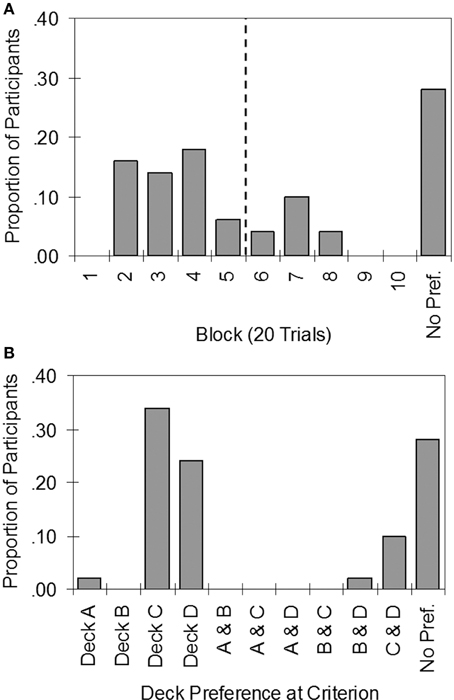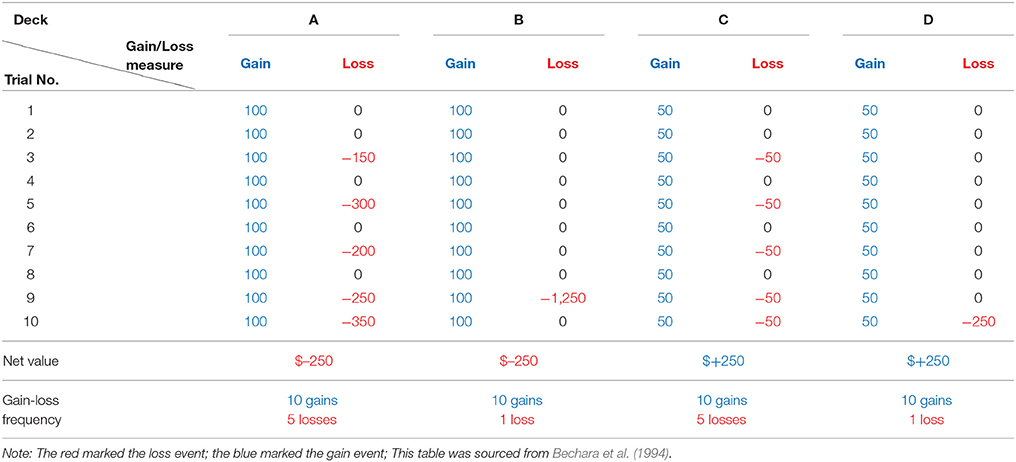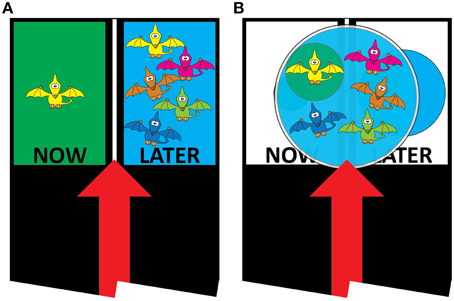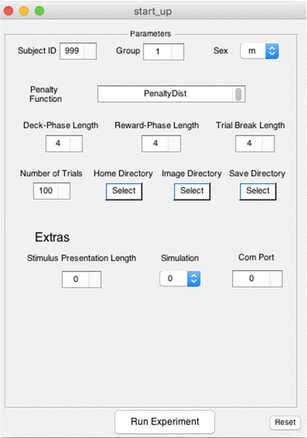Bechara Iowa Gambling Task
Start studying Iowa Gambling Task (Bechara et al.). Learn vocabulary, terms, and more with flashcards, games, and other study tools.
This task is based on Bechara et al's so-called 'Iowa Gambling task' In this procedure, subjects are given $2000 to begin. On each trial, they are given the choice of four decks, and after each card, they are given a reward of some amount; after some cards, they are given a reward and pay a penalty. Briefly, in the gambling task (also referred to as the Iowa gambling task), subjects have to choose between decks of cards which yield high immediate gain but larger future loss, i.e., long term loss, and decks which yield lower immediate gain but a smaller future loss, i.e., a long term gain.
Contents |
[edit]About
In this test, subject chooses from one of four decks, each having a different reward schedule. This task is based on Bechara et al's so-called 'Iowa Gambling task'
In this procedure, subjects are given $2000 to begin. On each trial, they are given the choice of four decks,and after each card, they are given a reward of some amount; after some cards, they are givena reward and pay a penalty.


[edit]Notes
The penalty/reward structure is identical to that in Bechara et al.with 40 cards per deck, and the identical reward structure.When 100 cards have been selected, the task is complete.
Iowa Gambling Task Bechara Et Al 1994
Unlike the real-world version, the deck is just rotated on each draw, so that the top card moves to the bottom of the 40-card deck,and so the sequence will repeat after 40 cards in the original order, rather than becoming exhausted after 40 draws.

[edit]Options
- By default, the penalty cards are in the order originally published by Bechara et al. Setting shuffleDecks <- 1 (from 0) will shuffle the penalty decks
Bechara 1994 Iowa Gambling Task
before the experiment. Shuffling is performed in 10-card epochs, so that the penalty in 1-10 stay in 1-10, etc.

- Baseline rewards for each deck can be changed as well, using the deck1Rew, deck2Rew, deck3Rew, and deck4Rew variables.
- The variable gUseMouse controls whether interaction is done using the mouse or keyboard input. Set to 0 for keyboard, 1 for mouse. It is 1 by default.
- The variable numtrials controls how many trials are used. Cards in decks get rotated from top to bottom, so there is no great danger of running out of cards.

[edit]Data Output
Data are saved to igt-X.txt, where X is the participant code. The columns are:
Each row is a trial. You are probably most interested in the proportion that each deck is chosen, which is the third column.
[edit]References
Bechara A, Damasio A. R., Damasio H, & Anderson S. W. (1994). Insensitivity to future consequences following damage to human prefrontal cortex. Cognition.
[edit]Research Using Test
- Kaare, P. R. (2008). Correlates of pathological gambling in Estonia: Personality, emotional states, self-esteem, cognitive ability and decision-making strategies. University of Tartu Master Thesis.
- Kaare, P. R., Mõttus, R., & Konstabel, K. (2009). Pathological Gambling in Estonia: Relationships with Personality, Self-Esteem, Emotional States and Cognitive Ability. Journal of Gambling Studies, 25(3), 377-390.
- Lipnicki, D. M., Gunga, H. C., Belavy, D. L., & Felsenberg, D. (2009). Bed Rest and Cognition: Effects on Executive Functioning and Reaction Time. Aviation, space, and environmental medicine, 80(12), 1018-1024. http://www.ncbi.nlm.nih.gov/pubmed/20027848
- Lipnicki, D. M., Gunga, H., Belavy, D. L., & Felsenberg, D. (2009). Decision making after 50 days of simulated weightlessness. Brain Research, 1280, 84-89. doi:10.1016/j.brainres.2009.05.022 http://www.ncbi.nlm.nih.gov/pubmed/19447099
[edit]See Also
